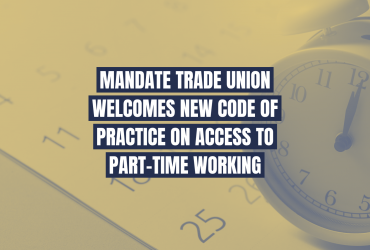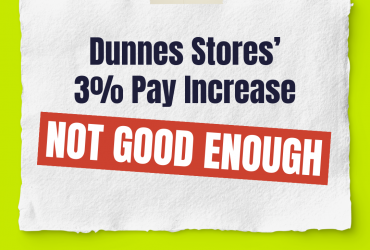When ISME cry ‘madness’ something is going right…
Tuesday 19 August 2014Mandate members’ recent pay rise successes have not gone unnoticed by employers’ bodies in Ireland. Mark Fielding, Chief Executive of the Irish Small and Medium Enterprises (ISME), went as far as to say looking for a pay rise is “madness” as the country is barely out of economic “intensive care”. He went on to suggest that “reckless union wage demands could sabotage [the] recovery.”
The Small Firms Association (SFA) used less emotive language stating that pay increases were “not a consideration” for its members at the moment.
What these employers’ bodies don’t mention is that it is their members, small and medium businesses, who will benefit most from the €20 million in pay increases Mandate members have won over the past 24 months.
Mandate members tend to spend almost all of their money in local shops, bars, restaurants and supporting local businesses and producers. So when they receive a pay increase, they can help small and medium enterprises represented by ISME and the SFA.
Mandate Assistant General Secretary Gerry Light went head to head with Mr Fielding on Radio Kerry where he called him out for his nonsense stance on pay rises.
“Mr Fielding is nothing if not consistent,” he said. “He was against pay rises for low-paid workers during the so called boom times – more than 10 years ago – and he’s still against them now. It appears ISME simply never want low paid workers to receive a pay increase.”
The fact of the matter is that workers in sectors such as the retail and bar industry are genuinely struggling to make ends meet. The numbers of those at work yet living in deprivation has more than doubled – from 6.6% in 2008 to 16.4% in 2012.
As was highlighted by Shopfloor in the past, profits are rising. So when employers’ bodies claim pay increases are “madness”, they’re saying they’re more concerned with protecting those profits while ignoring the growing social and economic crisis being faced by tens of thousands of workers across the country.
This attitude is not new. Michael O’Lehane, who headed up the Irish Drapers Assistants’ Association – a precusor to this union, writing more than 100 years ago about employers resisting pay increases, said: “No doubt we will be told ‘competition is keen,’ ‘we cannot afford to pay any more,’ ‘our neighbours are underselling us,’ etc, etc.
“This is all very fine for traders who have consistently adopted the cut-throat system of competition, whose sole object is to make money for themselves at the expense and to the detriment of their employees, but we say in reply to these, and to all whom it may concern that if the public are to be granted privileges by grasping, greedy employers, this must not be done at the expense of the workers, at the cost of cheap, sweated, and in many cases unpaid labour.” It seems some things never change. The workers of 1914 knew that the greatest manner in which to achieve a pay increase was by being members of their union and making sure every other worker is a member too.
When employers put on a show of unity to protect their interests, it is up to us as workers to show that same level of unity and organisation.
Employers’ representatives have but one purpose: to protect and increase profits for their members. Trade unions on the other hand have a completely different purpose as was defined by Cissy Cahalan, President of Mandate’s precursor union IDAA between 1921 and 1924: “The root principle of a trade union is not that of piling up capital but of improving the conditions of employment and lifting the workers to a higher state of existence.”
Join you union and get active today.
By David Gibney
Mandate communications officer






